Thinking about the difference between quartz vs marble might seem like another home improvement decision, but in reality it’s the kind of choice that sets the tone for your entire kitchen or bathroom. Ok, imagine walking into a space every day where the countertop either gleams with the soft, natural veins of marble or shows off the sleek, consistent finish of quartz. That’s not a small backdrop detail. It’s the main stage.
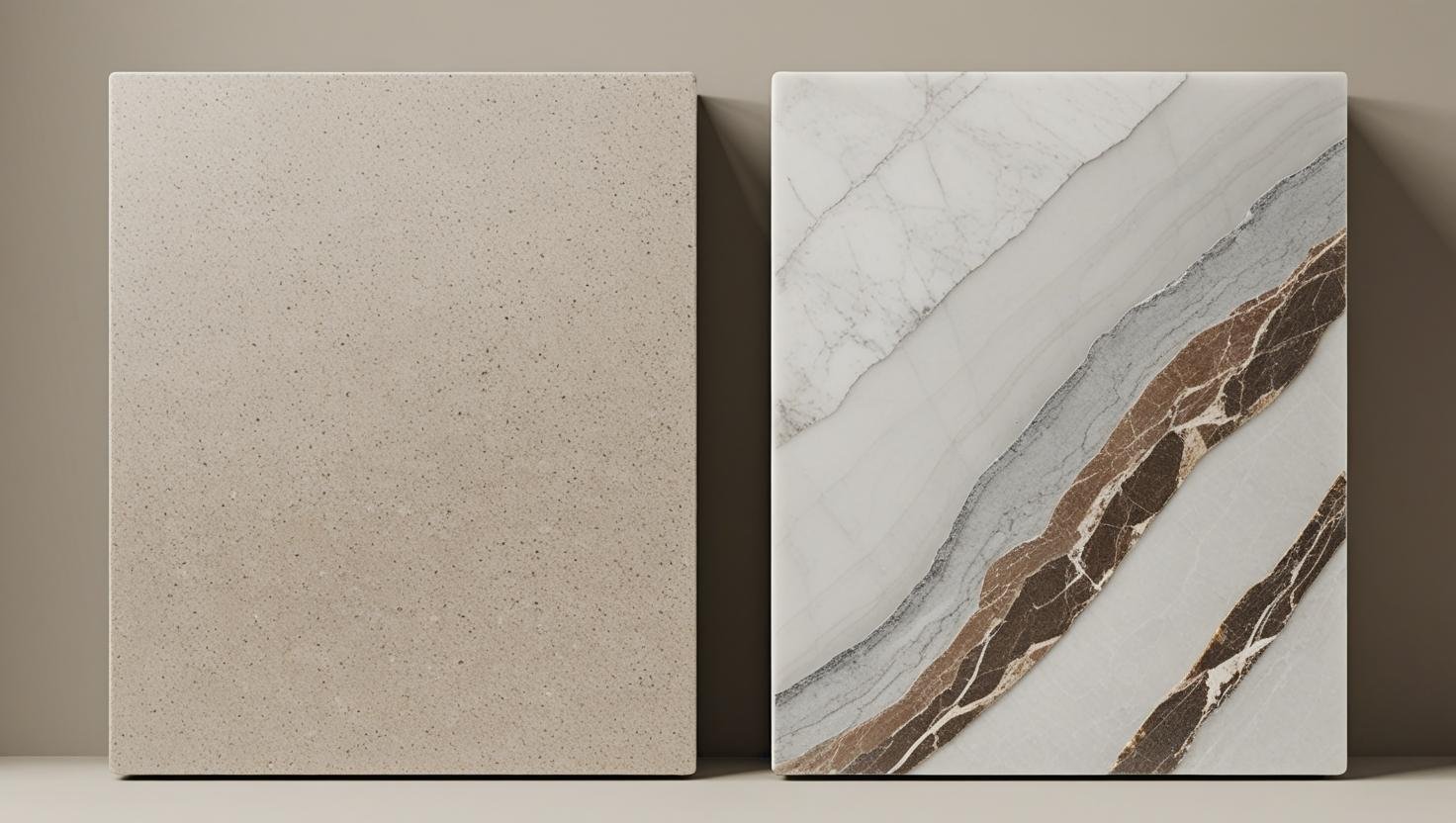
Homeowners and designers often wrestle with the comparison: Quartz vs Marble because both materials carry strong reputations. Marble whispers of timeless luxury, while quartz promises resilience and low-stress upkeep. One has history carved into its surface, the other is engineered to keep pace with modern living.
In this guide, you’ll see how the two stack up when it comes to cost, durability, upkeep, and style. We’ll also touch on how quartz and marble compare to granite, quartzite, cultured options, and newer alternatives. By the time you’re done reading, you’ll know exactly which direction makes sense for your home and your lifestyle.
Quartz vs Marble: quick comparison
If you’re torn between quartz and marble, this is the part you want to pay attention to. Think of it as a snapshot of what really separates them. I’ve set it side by side so you can size them up without wading through endless design blogs.
Marble vs Quartz Countertops
| Feature | Marble | Quartz |
| Material Type | 100% natural stone, cut from quarries | Engineered surface: crushed quartz + resin |
| Appearance | Unique veins, patterns never repeat; classic and elegant | More uniform look, wide range of colors, even mimics marble |
| Durability & Resistance | Softer, scratches and stains show if you’re not careful | Harder, more resistant to scratches, stains, and daily wear |
| Maintenance | Needs sealing, extra care with spills like wine or coffee | Low maintenance, no sealing needed, easy wipe-down |
| Price Range | Usually higher, especially for rare slabs like Calacatta | Often slightly less expensive but premium quartz can cost just as much as marble |
| Best For | Luxury kitchens, bathroom vanities, places where the “statement look” matters | Busy kitchens, family spaces, modern designs where durability is a priority |
Let’s break it down in real life terms:
- Material type: Marble is like inheriting a classic heirloom, it’s one of a kind. Quartz feels more like modern design made practical, crafted with consistency in mind.
- Appearance: If you like surprises, marble’s natural veins and swirls never repeat. Quartz is more predictable, which is great if you want everything to look clean and in sync.
- Durability: Marble has that softer, romantic appeal but can scratch if kids decide the island is a racetrack for toy cars. Quartz can take daily bumps without flinching.
- Maintenance: Marble is a bit like owning a white shirt, gorgeous but needs attention. Quartz is more forgiving and works for people who don’t want to think much about upkeep.
- Price: Marble often costs more, but not always. High-end quartz is creeping into the same ballpark. So it’s less about one “always being cheaper” and more about which specific slab you fall in love with.
- Best use cases: If you want your space to look like a magazine spread, marble gives that unmatched natural touch. If you want beauty but don’t want to babysit your counters forever, quartz is the safer play.
Here is my tip: I know families with marble kitchens who swear the stains and scratches give it character, almost like a leather jacket that gets better with age. Others can’t stand the thought of a coffee ring setting in. If you’re in the second group, quartz will feel like a gift.
What is Marble?
Marble has been around long before kitchen trends and Pinterest boards, think ancient temples, statues, and palaces. What makes people still obsessed with it today is the same thing that caught the eye thousands of years ago: the veining. No two marble slabs are identical, and those soft, organic lines across the surface feel almost like nature’s fingerprint. That’s why when someone walks into a kitchen or dining room with a big marble surface, it instantly feels like the space has a story.
Where you’ll see marble
You will not see marble used just as a countertop. you will also marble dining tables, bathroom vanities, flooring, and even accent walls. If you’ve ever seen a polished slab catching the sunlight, you understand why designers reach for it when they want drama and elegance at the same time.
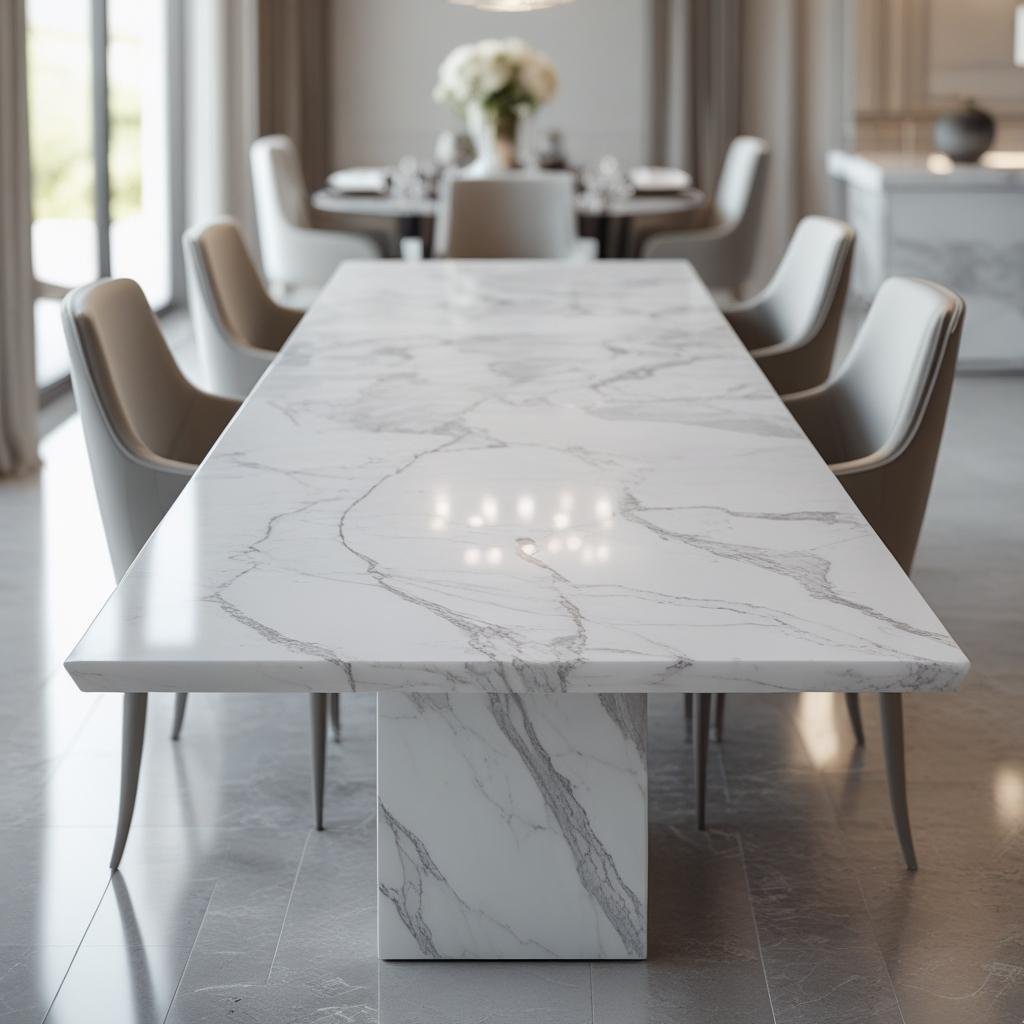
The upside of Marble
- Appearance you can’t fake: Even the best marble-look quartz still struggles to catch the unpredictable beauty of natural veining.
- Luxury appeal: It carries a prestige. A marble island in your kitchen is like putting a grand piano in your living room, it changes the entire vibe of the space.
- Cool surface: Bakers and chefs love it because it naturally stays cooler, which is perfect for rolling out dough.
The challenges of Marble
- It’s softer: If you’re expecting a perfect, scratch-free surface forever, marble will test your patience. Knives, pots, or even sliding plates can leave marks.
- Staining is real: Wine, coffee, lemon juice, all the things you actually use in a kitchen, can leave a mark if not cleaned up quickly.
- Maintenance is ongoing: It needs sealing, and not everyone has the patience to keep up with it.
My recommendation – Quartz vs Marble
Marble is best suited for people who love the idea of a countertop with character. If small scratches or a faint stain make you panic, marble is probably going to frustrate you. But if you see those marks as “living history” that adds to the charm, then marble becomes even better with age. Personally, I’d choose marble in a guest bathroom vanity or a statement dining table, places where it gets noticed but doesn’t face daily cooking chaos. In a busy kitchen, I usually nudge people toward quartz unless they’re truly set on that natural stone soul.
What is Quartz?
Quartz isn’t dug straight out of the ground the way marble or granite is. It’s engineered, made by combining crushed quartz crystals with resins and pigments. That mix is then pressed into slabs that are durable and also come in just about every style and color you can imagine. Marble lovers say that marble feels like discovering a rare work of art. Quartz lovers would say quartz feels like choosing from a designer catalog where you know exactly what you’re getting.
Where you’ll see Quartz
Quartz dominates modern kitchens and bathrooms. Countertops, backsplashes, even sleek tabletops. Its consistency makes it especially popular in homes where people want a “clean, seamless” aesthetic instead of lots of natural variation. Many quartz lines are designed to mimic marble too, so you’ll see slabs with gray veining patterns that look surprisingly close to the real thing.
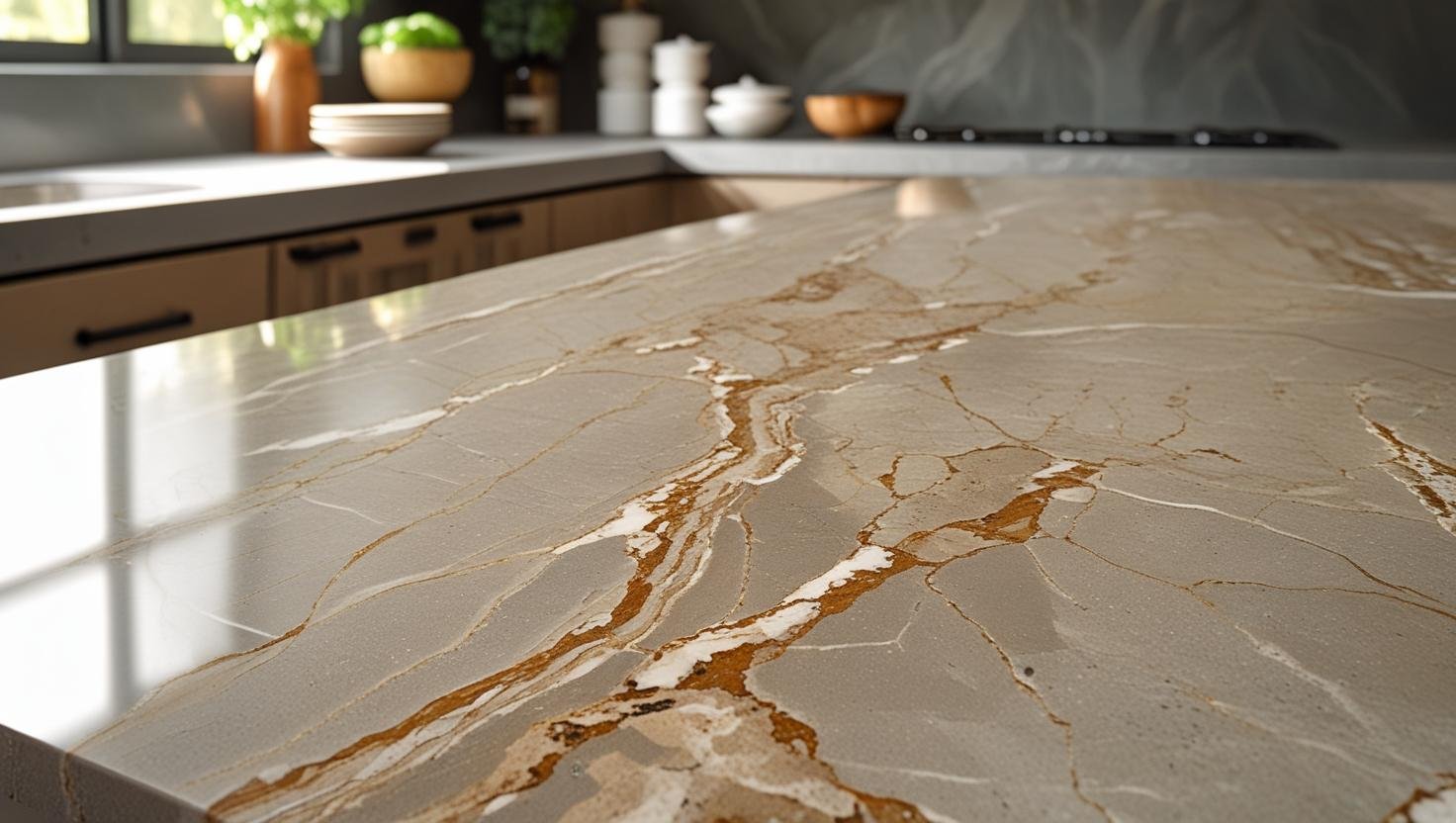
The upside of Quartz
- Tough surface: Quartz is harder than marble, and the resin makes it much less likely to scratch or stain in everyday use.
- Low maintenance: No sealing required. Just a damp cloth and you’re good.
- Huge variety: From simple whites to bold blacks, sparkles, and marble look-alikes, you’ll find something that fits your taste.
- Consistent design: What you see in the showroom is what you’ll see in your kitchen.
The challenges of Quartz
- Not heat-proof: Set a hot pan down directly from the stove, and you may scorch it. That resin content doesn’t love extreme heat.
- Less unique: Because it’s manufactured in consistent batches, it doesn’t carry the same one-of-a-kind personality that natural stone does.
- Price can creep up: While often seen as the “budget alternative” to marble, premium quartz designs can match or even pass the price of some marble slabs.
My recommendation – Quartz vs Marble
Quartz is fantastic for busy households, families with kids, people who practically live in their kitchens, or anyone who doesn’t want to fuss over stains. I usually suggest it if you need something strong, stylish, and low-maintenance. Imagine a kitchen where you can spill wine, drop a spoon, or chop vegetables directly on the surface without constant worry, that’s quartz.
That said, if you’re the type who values uniqueness and natural beauty above all else, quartz might feel a little too “perfect.” In that case, marble or even quartzite may be a better emotional fit. But for long-term convenience paired with modern design flexibility, quartz is hard to beat.

Read more about
Marble Top Dining Table
What makes a marble top dining room table so popular isn’t only its elegance, it’s also the incredible durability and versatility it brings to a home. A single piece can look at home in a modern city apartment, a cozy family dining room, or even a formal entertaining space.
Quartz vs Marble countertops
If you’re trying to choose between marble vs quartz countertops, here’s how they measure up on the most talked‑about categories. Think of this as a quick tour, not a lecture.

a. Appearance & Aesthetics
Marble brings drama with its bold, unpredictable veining. No slab is ever the same, which is why people call it timeless. Quartz, on the other hand, is about consistency. It’s cleaner, more uniform, and if you want that marble‑like look without the surprises, you can even pick a quartz that mimics veins. In short: marble for old‑world charm, quartz for modern order.
b. Durability & Longevity
Marble is softer, which means it can scratch if you’re rough with it and stain if you spill. Quartz holds up better to everyday life thanks to its engineered makeup. The one thing quartz doesn’t love is direct heat, so keep those trivets handy. If endurance is the game, quartz usually wins, but marble lovers accept the wear as part of its character.
c. Maintenance & Care
Marble needs attention. Seal it regularly, wipe spills quickly, and avoid harsh cleaners. Quartz is much easier. You wipe it down and move on with your life. If you’re someone who already dreads cleaning days, quartz will feel like a relief.
d. Cost Comparison
Marble has a reputation for being pricey, but quartz isn’t always cheap either. Entry‑level quartz might come in lower, but once you start looking at premium slabs, the prices overlap. Luxury marbles like Calacatta are usually at the top of the scale, while high‑end quartz designs can creep into that territory too. Installation costs are roughly the same, so it’s really about the slab you fall in love with.
e. Resale Value & Market Perception
Marble still carries that luxury badge. For some buyers, walking into a kitchen with authentic marble countertops feels like a dream. Quartz, though, has become the practical favorite. Real estate agents know it appeals to busy homeowners who don’t want constant upkeep. Both can boost resale, but marble tends to please the eye, while quartz pleases the lifestyle.
My takeaway: go marble if you want natural drama, go quartz if you want everyday peace of mind.
Marble vs Quartz vs Granite
By now, you’ve got a sense of quartz vs marble, but chances are you’ve also heard granite vs quartzite vs cultured marble, or Corian tossed into the mix. Let’s line them up so you can see how each really compares without needing five more browser tabs.
| Material | Type | Durability | Maintenance | Price Range | Best Fit |
| Marble | Natural stone | Softer, more scratch and stain‑prone | Needs sealing, careful upkeep | Higher, especially rare slabs | Luxury, statement spaces |
| Quartz | Engineered surface | Very durable, but avoid hot pans | Easy care, no sealing | Mid to high, can rival marble | Busy kitchens, modern homes |
| Granite | Natural stone | Tough, heat resistant | Needs periodic sealing | Mid to high | Everyday use with natural stone look |
| Quartzite | Natural stone | Stronger than marble, similar look | Needs sealing, more durable | Mid to high | For those who love marble’s look but want strength |
| Cultured Marble | Man‑made blend (powder + resin) | Softer than quartz | Low maintenance | Lower | Budget bathrooms, vanity tops |
| Engineered Marble | Natural stone dust + resin | More resilient than true marble, but not as tough as quartz | Low maintenance | Mid | Places where marble “look” matters but budget/practicality comes first |
| Corian (Solid Surface) | Synthetically made (acrylic/polyester) | Softer, scratches easier | Easy to sand/refinish, no sealing needed | Lower to mid | Tight budgets, rental units, non‑luxury projects |
Granite vs Quartz vs Marble:
Granite is the tough, rugged natural stone, quartz is the low-maintenance choice, and marble is all about high style but needs more care.
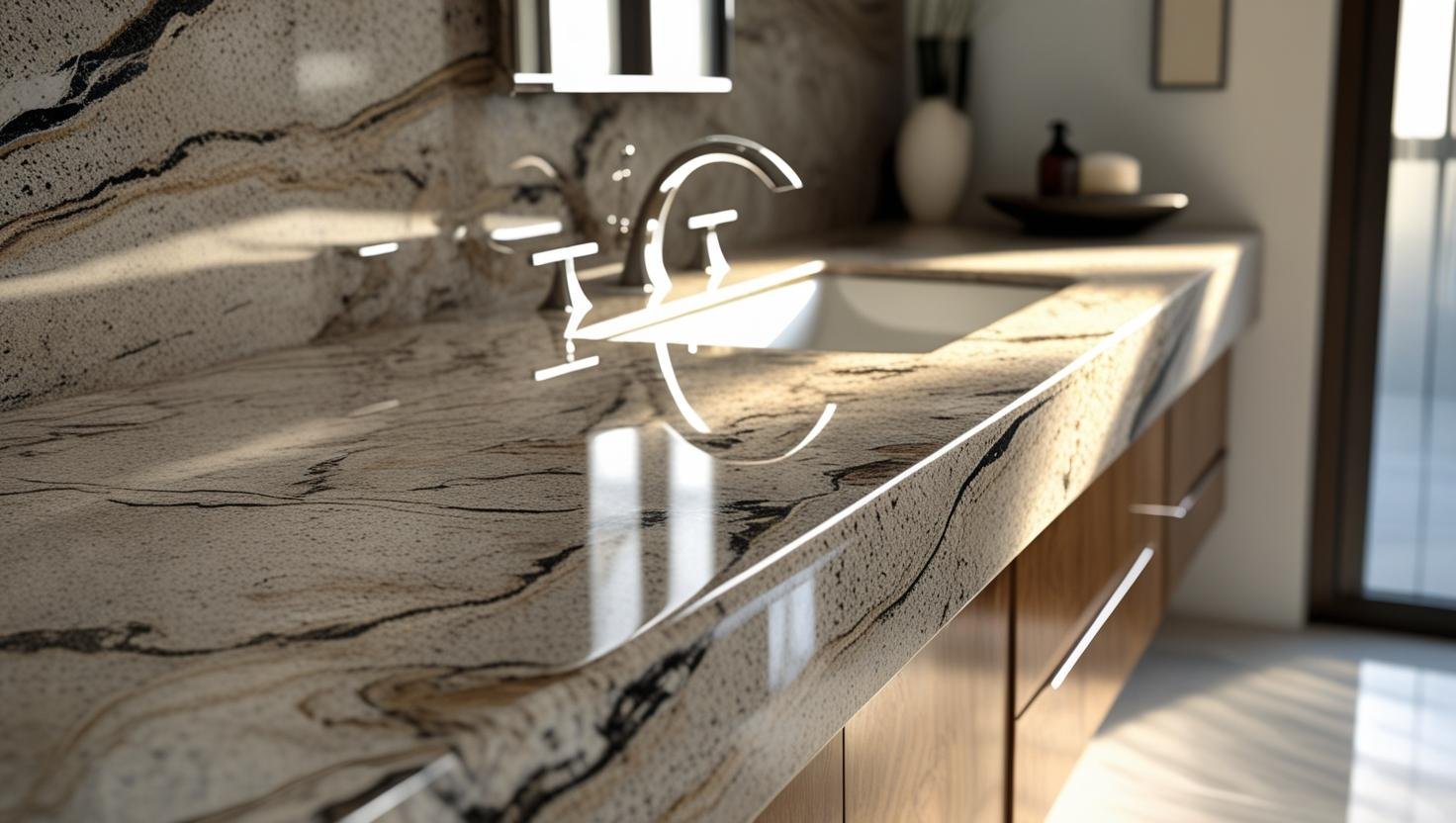
Quartzite is like marble’s stronger cousin, still organic looking but handles everyday wear better.
Cultured marble is the budget-friendly option that works well in bathrooms but doesn’t hold up like quartz. Engineered marble and quartz are both man-made, but quartz tends to be sturdier since engineered marble can chip easier. Corian is the most wallet-friendly but doesn’t have the same shine as quartz or the luxury vibe of marble.
So what does this mean?
If you want luxury personality, marble wins. If you want low‑stress strength, quartz wins. If you want a middle ground that’s still natural, granite or quartzite are worth a look. And if your wallet’s in charge, cultured marble or Corian step in.
Which is better for you?
Picking between quartz and marble is about how you live and what you expect from your space. Here’s a quick rundown on which surface tends to work best depending on your lifestyle and style.
For busy kitchens
If your kitchen is the hub of life, kids doing homework, the dog begging for scraps, someone always cooking, quartz usually wins hands down. It can take spills, scratches, and a hustle without complaining. You don’t have to seal it or worry about stains setting in. Basically, quartz lets you live freely without staring at your countertop nervously.
For luxury bathrooms
Marble fits perfectly here. Bathrooms have lower traffic than kitchens and are not usually the scene of wild cooking messes. Marble’s natural luxury vibe turns a bathroom into a spa‑level retreat. Plus, it’s easy to keep an eye on maintenance where water and makeup smudges are the main concerns.
For low-maintenance households
If you’re someone who likes the idea of beautiful surfaces without spending weekends scrubbing or sealing, quartz will feel like a gift from the countertop gods. It takes what you throw at it without fuss and still looks great, years down the line.
At the end of the day, think less about which one is “better” and more about which one fits your day-to-day life. Your countertop should work with your rhythm, not against it.
Quartz vs Marble, who wins?
There’s no “one size fits all” answer to quartz vs marble, who wins. It’s really about what suits your lifestyle and what you want from your space. If you’re after something that feels timeless and full of natural character, and you don’t mind putting in a little extra care, marble is a beautiful choice that ages like a story.
If you want something tough, low-maintenance, and reliable enough for all the chaos a busy kitchen can throw at it, quartz will give you more peace of mind without sacrificing style.
Think about how you live, what kind of kitchen or bathroom you want to spend time in, and which material will be happiest with your daily routine. That’s the secret to making a choice you’ll feel good about every day.
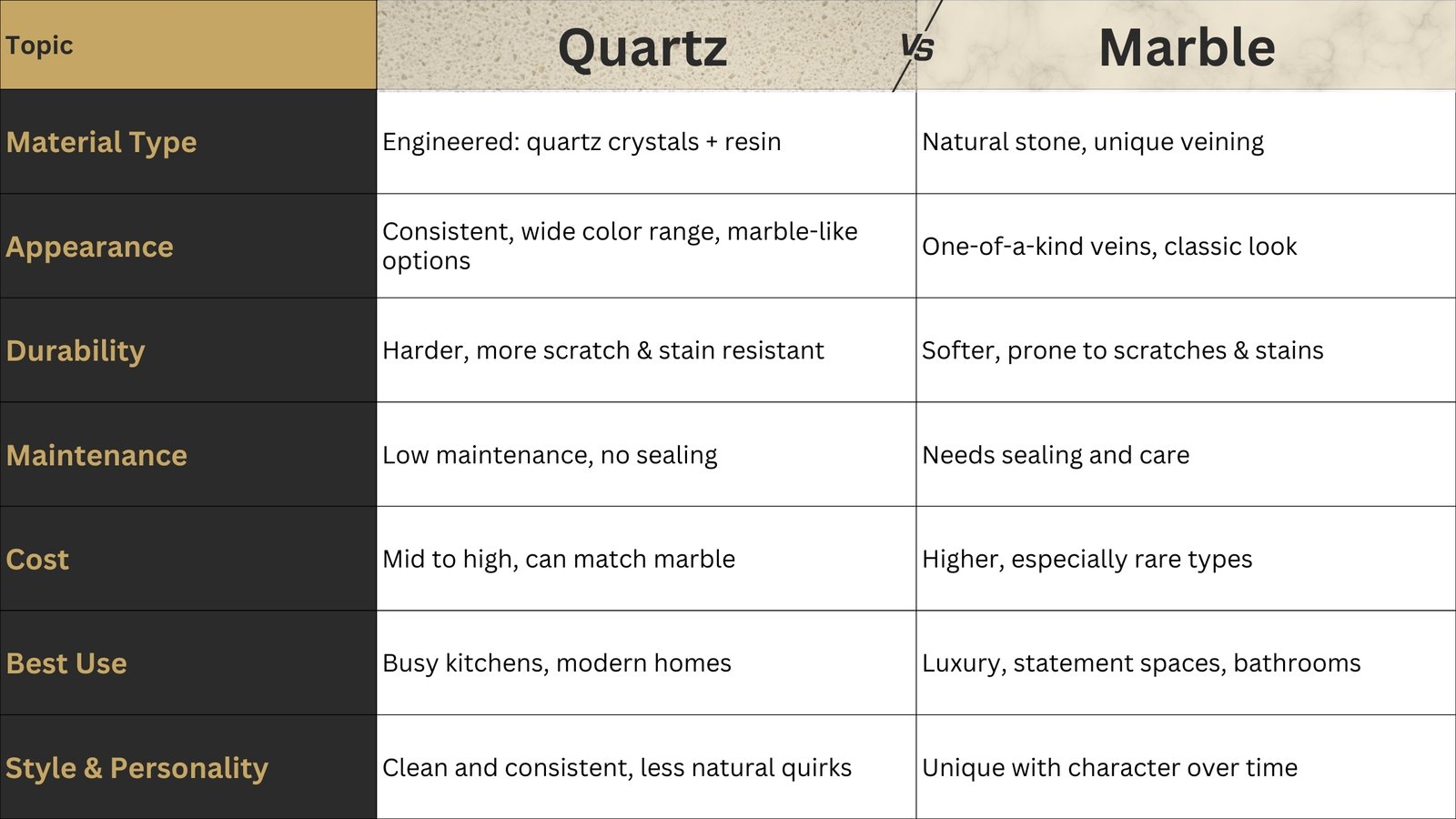
FAQ Quartz vs Marble
Yes, quartz is generally harder than marble. Marble is softer and can scratch or chip more easily, while quartz’s engineered surface makes it tougher and more resistant to scratches and daily wear.
Cultured marble is a man-made material made by mixing crushed marble with resin. It looks somewhat like real marble but is softer and more budget-friendly. Quartz, on the other hand, uses crushed natural quartz mixed with resin, which makes it more durable and low-maintenance compared to cultured marble.
Marble is more prone to staining because it’s porous. Spills from wine, coffee, or citrus need quick cleanup to avoid marks. Quartz is much better at resisting stains since it’s sealed during manufacturing and doesn’t need additional sealing.
It depends on the specific type, but often premium quartz and certain types of marble (like Calacatta) can be similar in cost. Entry-level quartz usually comes in cheaper than high-end marble, but both can range widely based on brand, quality, and rarity.
For most busy kitchens, quartz is often the better choice because it’s tougher and requires less maintenance. Marble shines in spaces where you’re willing to be more careful or want a natural stone’s unique look.
Granite and quartzite are natural stones that tend to be tougher and more heat resistant than marble. Quartzite has a similar look to marble but with better durability. Quartz (engineered) is also very durable, even more so than many natural stones in some ways. Marble usually needs the most care to keep it looking its best.
